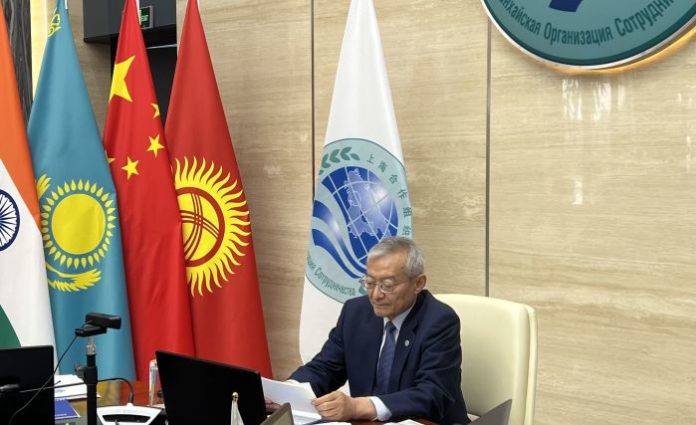
by Riccardo Cacelli
London – Yesterday, India chaired a meeting (final event of India’s SCO presidency in 2022-2023) of the heads of state of the SCO (Shanghai Cooperation Organisation) via video conference.
The meeting was attended by the:
– Prime Minister of the Republic of India Narendra Modi;
– President of the Republic of Kazakhstan Kassym-Jomart Tokayev;
– President of the People’s Republic of China Xi Jinping;
– President of the Republic of Kyrgyzstan Sadyr Japarov;
– President of the Russian Federation Vladimir Putin;
– President of the Republic of Tajikistan Emomali Rahmon;
– President of the Republic of Uzbekistan Shavkat Mirziyoyev.
The meeting was also attended by SCO Secretary General Zhang Ming and Executive Committee Director of the SCO Regional Counter-Terrorism Structure Ruslan Mirzayev.
Zhang Ming reported on the SCO’s activities over the past year.
The meeting was also attended by the heads of observer states, including;
– President of the Republic of Belarus Alexander Lukashenko;
– President of the Islamic Republic of Iran Seyyed Ebrahim Raisi;
– President of Mongolia Ukhnaagiin Khurelsukh;
as well as President of Turkmenistan SerdarBerdimuhamedov, as a guest of the Indian side.
The event was also attended by the heads of executive agencies of the United Nations, the CIS, the CSTO, the EAEU, the Conference on Confidence-Building Measures and Interaction in Asia (CICA), and ASEAN. The summit participants focused on the state of multilateral cooperation in all spheres of the SCO’s activity and its development prospects, including political and security issues, trade and investment, transport and energy, culture and humanitarian exchanges.
Leaders discussed global and regional developments in detail and prioritized joint efforts to counter current threats and challenges. They exchanged views on the streamlining of the SCO’s activities, the modernization of its executive mechanisms and the prospects for the Organization’s expansion.
Participants reaffirmed their commitment to forging a more diverse, democratic, equitable and multipolar world order, based on generally recognized principles of international law, multilateralism, equal, indivisible, global and stable security, cultural and civilizational diversity, mutually beneficial cooperation and equitable between states, with the United Nations playing a central coordinating role.
The parties signed or approved 14 joint documents, including the New Delhi Declaration, a declaration on countering radicalization leading to terrorism, separatism and extremism, a declaration on cooperation in the field of digital transformation, as well as a number of decisions on some aspects of the Organization’s activities.
One of the key outcomes of the summit was the completion of a procedure for the admission of the Islamic Republic of Iran into the Organization as a member state. Now the SCO has nine member states.
Minsk also took a further step towards SCO member status, with the signing by interested parties of a memorandum on the obligations of the Republic of Belarus in order to obtain the status of SCO member state.
Riccardo Cacelli


